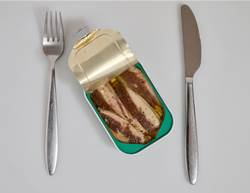Food matters. A lot. But maybe it matters even more than we knew.
A recent Australian study suggests that a positive change in diet can have a profound effect on adults with major depression. The study was published in BMC Medicine this January, and was conducted by Felice Jacka and her team at Australia's Deakin University.
The researchers implemented a 12-week program to test their theory about the correlation between depression and diet. The test was not about losing weight—simply about getting people eating healthier foods, and determining if those positive dietary changes would have an effect on depression.
MORE: 10 Women Share What Depression Really Feels Like
The depressed people in the study all reported eating relatively unhealthy food (such as fast food, and food high in preservatives, sweeteners, and excess carbohydrates) often.
Half of them were then put on a modified Mediterranean diet, increasing their intake of vegetables, natural fats, fish, and whole grains, and decreasing their dependence on refined carbs. They were also required to see a nutritionist in addition to their other typical therapeutic or clinical methods of dealing with their depression. The other half stayed on their normal eating schedule, but were given an additional social support sessions to try to boost their moods, in addition to their other typical routine. To determine the effects of the healthy food, the researchers used the MADRS scale (Montgomery–Åsberg Depression Rating Scale) of measuring a person's mood on a scale of 0 to 60 (0 is happiest, and 60 is the most severely depressed).
The results of the study were dramatic: Three months later, the group that modified their diet with healthy, fresh foods had MADRS scores that improved by an average of 11 points, meaning their emotional wellbeing significantly improved. 32 percent (10 out of 31) had MADRS scores so low that they no longer even met the criteria for having depression. Those who didn't change their diet improved by an average of only 4 points and only 8 percent (2 of 25) no longer met critera for depression.
MORE: 5 Foods That Make You Anxious
This isn't the first study to come out of Australia recently that suggests that eating more fruit and vegetables can cause major life happiness. A recent study published in The American Journal of Public Health suggested that amping up your fruit and vegetable consumption could boost your happiness as much as going from being unemployed to getting a job. Maybe that explains why some governments are starting to ban junk food all together.
For major depression, dietary changes won't—and shouldn't—replace therapy or drug treatment, but these studies show that what we eat has a tremendous influence on our overall sense of wellbeing. Though the researchers acknowledge that this is a preliminary study, and more research is needed, their results show how something as simple as a change of diet can influence depression—and help everyone feel happier in general.
For a closer look, check out this ABC News Australia video of one of the participants in the study, Sarah Keeble:










